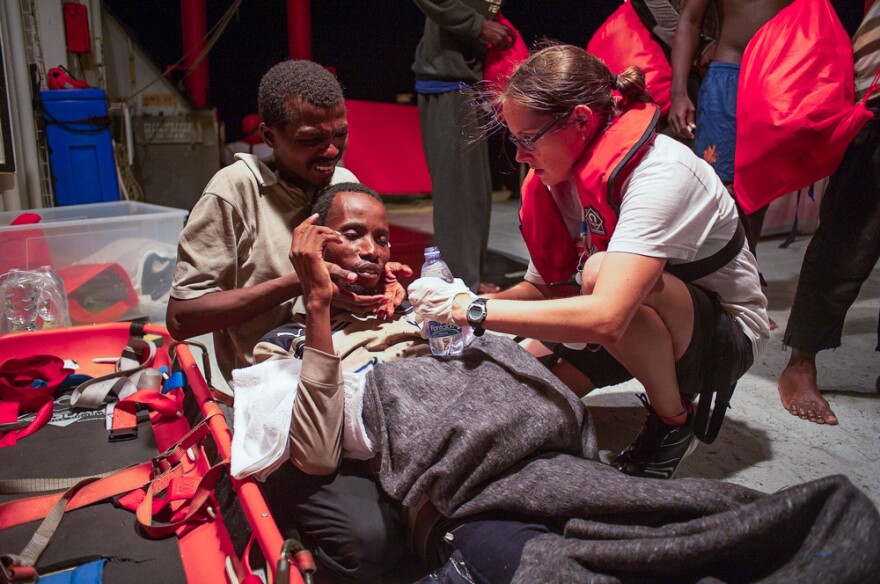Editor's note: This conversation discusses the issue of rape.
Dr. Sarah Giles spent the past four months aboard a search and rescue boat in the Mediterranean. A physician with Doctors Without Borders, she has aided refugees — many of whom had left Libya, piled into unsafe and overcrowded boats looking for a better life in Europe.
More than 4,600 people have drowned or gone missing this year attempting to make the trip.
As part of her work, Giles has cared for women who were pregnant — some of whom had been raped. Sexual abuse has become such a problem for women making this journey that some are choosing to have long-term contraceptive implants put in their arm before they leave.
Giles spoke with NPR's Scott Simon about the situation.
Tell us about these women.
I think the first thing everyone has to know — these are incredibly strong women. They are fleeing terrible circumstances, but by the time I had met them the things they had gone through defied my belief. I'm convinced that they'll go on to be amazing additions to any country they go to that's lucky enough to have them. Their experience defied belief.
Help us understand that — what did they tell you?
These women had all fled their home countries for very good reasons. Sometimes they were being persecuted for their political beliefs. But other times they told me their parents had died and that they had been sold into prostitution. I met a 14-year-old who had been forcibly married at the age of 12 and was fleeing continuous rape at home. So just the act of leaving their homes was a brave start.
They were smuggled across Africa, some of them walking across the Sahara. One woman told me she started in a group of four and she was the only one who had survived. They then had to travel through Libya. People who are smuggled through Libya are often kidnapped multiple times. So they're kidnapped, sometimes tortured. They have to pay off their kidnappers somehow, sometimes that's through forced prostitution, forced labor.
I think anyone hearing this will find it horrifying. What can be done to help?
I don't know. The No. 1 thing we need to do is to stop criminalizing the act of seeking refuge. More and more we see governments building literal walls — physical walls. We see them increasing the military presence in the Mediterranean rather than increasing the search and rescue presence. No one wants to leave home. Home is home. Home is where your family is. No one wants to get into a boat with 167 other people where you have a 1 in 42 chance of drowning. People only do that if the sea is safer than the land.
How do you handle the consequences of rape? There's no one or obvious answer.
No — and on the boat we spoke a lot with women about rape. I'm sure there were men who had also been raped but were not coming forward to talk about it. It's become a tool of war, a tool of oppression. And women are obviously more susceptible to it. There's some sort of gap in people's minds that allows them to treat people who are different from them as subhuman. And I don't know how you prevent that from happening.
I gather there were women who asked you for medical help.
Yes, so some of the women who had been raped asked to know if they were pregnant. One of the most heartbreaking things I would have to do was to confirm for women that they were indeed pregnant as a result of rape. Some were requesting testing for sexually transmitted infections, which we couldn't do on the boat but we helped to arrange in Italy once we arrived there.
One of the things I say about my work is I often come across the best of humanity, but I also come across worst of humanity. These women, especially, told me of things that had happened to them — that it never occurred to me that humans could do that to one another.
What do we need to hear?
People who are searching for a better life are doing exactly what you or I would do if we were in the same place. They just want what's best for their family. They are not looking to take our jobs. They are not looking to make our lives worse. They are just desperately trying to get a little piece of a better life that we already enjoy.
Copyright 2021 NPR. To see more, visit https://www.npr.org.


